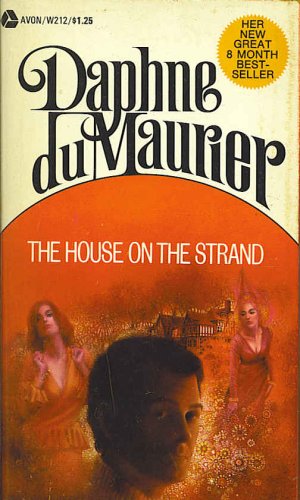Dick Young is staying at the country home of his good friend, the Professor Magnus Lane, called Kilmarth, in Cornwall, Britain's southwestern arm. He is alone, waiting for his wife Vita and her two sons to join him, and in the meantime, Magnus, back in London, entreats his help in a scientific experiment he's been working on: in the house's laboratory there is a drug which, while leaving Dick's body in the present, will transport him back to the Cornwall of the fourteenth century.
It's such a clever twist on the time travel narrative, it's hard to believe it hasn't been recycled since du Maurier published The House on the Strand in 1969. The risk is almost ludicrous; wherever Dick goes in the past, he goes in the present also, wandering blind around modern Cornwall, with its vastly modified terrain and its automobiles. Nor can Dick voluntarily confine himself to a single room, since he seems to be bound inexplicably to a squire named Roger, and can only move as he moves. In the company of Roger, who cannot see him, Dick observes an intense drama over the course of many "trips" and many decades: the machinations of the Otto Bodrugan against the crown, his secret love affair with the beautiful lady Isolda, and his death just off the Cornish shore at the hands of his brother-in-law Oliver's men.
Honestly, the medieval narrative is pretty boring. There's no incentive to care about Otto or Isolda, who must have lived much more largely in du Maurier's imagination than they do on the page. But what is captivating is Dick's captivation: his smoldering love for Isolda, dead for five hundred years, and his increasing need for the drug, which is borrowed from the language of real-life drug addiction. Dick is willing to undertake the ludicrous risks because he begins to feel his life in the present inherently lacking. When his wife and stepsons arrive, he schemes again and again to evade them so he might travel back in time, and these minor schemes, and Vita's increasingly exasperated reactions to them, are infinitely more fun than the historical drama.
When Dick talks about the drug, he sounds like Timothy Leary talking about LSD:
...There was no past, no present, no future. Everything living is part of the whole. We are all bound, one to the other, through time and eternity, and, our senses once opened, as mine had been opened by the drug, to a new understanding of his world and mine, fusion would take place, there would be no separation, there would be no death... This would be the ultimate meaning of the experiment, surely, that by moving about in time death was destroyed.
But like Leary and, I guess, every other unrehabilitated addict, Dick only sees life because his addiction blinds him to the real possibility of death. His imagined "fusion" with Roger is not, and cannot be reciprocated, though his marriage crumbles. He flees not from death, but life--which du Maurier hammers home by giving his wife the name "Vita." This dynamic is underscored when Magnus, coming to Kilmarth at last, takes the drug upon arrival and ends up flattened by a moving train. By this point, Dick is too far gone, too enveloped by his own addiction. The historical drama resolves as it begins, blandly, but the drama of a man tearing his life apart piece by piece for a lonely glimpse into a world far gone is what really makes this a gripping story.


1 comment:
Du Maurier is a hugely underappreciated writer. This sounds great.
Post a Comment